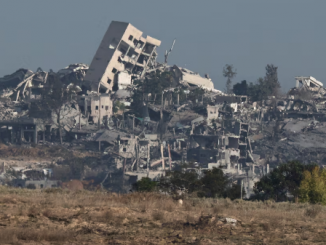
| Published May 26, 2025
Israeli official says framework, presented by Palestinian-American businessman Bashara Bahbah, demands terms that amount to a de facto surrender to Hamas
Israel rejected a ceasefire and hostage release proposal involving Hamas, citing unacceptable terms and discrepancies in the proposed deal.
The Proposal and Its Rejection
The proposal, reportedly presented by U.S. special envoy Steve Witkoff, included a 60-day ceasefire, the release of 10 Israeli hostages (five at the beginning and five at the end), partial Israeli withdrawal from Gaza, and the release of Palestinian prisoners. Hamas claimed to have accepted this proposal.
However, Witkoff denied that such a proposal was officially presented by the U.S., stating that the terms Hamas referred to were “disappointing and completely unacceptable.” He clarified that the actual proposal involved a 45- to 60-day ceasefire in exchange for the release of 10 live and 19 deceased hostages, along with Palestinian prisoner releases.
Israel also rejected the proposal, with Prime Minister Benjamin Netanyahu’s office stating that no temporary deal would be accepted unless it aligned with Israel’s goal to eliminate Hamas.
Ongoing Conflict and Humanitarian Concerns
The rejection of the ceasefire proposal comes amid ongoing military operations in Gaza. On May 26, Israeli airstrikes resulted in the deaths of at least 52 people, including 36 individuals in a school-turned-shelter in Gaza City. The Israeli military claimed the school housed Hamas and Islamic Jihad militants using it as a command center.
The conflict, which escalated after Hamas’s October 2023 attacks that resulted in 1,200 Israeli deaths and 251 hostages, has left nearly 54,000 Palestinians dead and caused widespread devastation and malnutrition in Gaza, according to local health authorities and aid groups.
International Reactions
The ongoing conflict and the rejection of the ceasefire proposal have drawn international criticism. German Chancellor Friedrich Merz stated that Israel’s actions in Gaza “can no longer be justified,” expressing confusion over the Israeli army’s objectives amid mounting international and domestic criticism.
Meanwhile, the head of the Israel-backed Gaza Humanitarian Foundation resigned, citing concerns over compromising key humanitarian principles. His resignation casts doubt on the feasibility of the Israeli-led, US-approved aid distribution plan for Gaza, which faces severe famine after over a year of warfare and blockade.
Meanwhile, internal unrest over Netanyahu’s commitment to war grows…
The implications of Israel rejecting the latest proposed ceasefire with Hamas are significant and multifaceted, shaping military, diplomatic, and humanitarian developments across the region and beyond:
1. Extended Conflict and Civilian Suffering
Israel’s firm stance signals that military operations in Gaza will continue indefinitely. This prolongs civilian casualties, worsens humanitarian conditions, and heightens the risk of famine, as aid delivery remains constrained and urban warfare escalates.
2. Collapse of Diplomatic Mediation
By rejecting a proposal allegedly backed—or at least facilitated—by U.S. special envoy Steve Witkoff, Israel undermines U.S. diplomatic leverage in the region. It also exposes fractures between the U.S., its allies, and Israel on how to end the conflict.
3. Erosion of International Support
Continued operations, especially after high-casualty events like airstrikes on shelters, are straining Israel’s global support. Statements from leaders like Germany’s chancellor and the resignation of humanitarian coordinators suggest growing frustration even among Israel’s traditional allies.
4. Hamas Propaganda Opportunity
Hamas is leveraging the optics of “accepting” a peace deal to portray Israel as the aggressor and itself as a willing negotiator. This plays well both domestically and across sympathetic media in the Arab and broader Muslim world.
5. West Bank and Regional Unrest
The longer Gaza burns, the more unstable the West Bank becomes—and the higher the likelihood of Hezbollah or other Iranian-backed proxies escalating the conflict regionally, pulling Lebanon, Syria, or even Iraq into direct confrontations.
6. U.S. Political Repercussions
The Biden and Trump camps now find themselves entangled in conflicting narratives about peace initiatives. Trump’s envoy being involved—and then distancing himself—will likely become a political talking point in U.S. election debates over Middle East policy.
Overall Takeaway:
Israel’s rejection of the latest ceasefire proposal highlights a deepening impasse rooted in irreconcilable goals—Israel seeks Hamas’s total dismantlement, while Hamas leverages humanitarian crises for political gain. The failed deal underscores the collapse of diplomatic momentum, the diminishing influence of international mediators (including U.S. figures), and the growing human cost of a conflict with no off-ramp in sight. As civilian suffering escalates and allies express discontent, the war risks becoming a prolonged quagmire with regional destabilization potential.
SOURCES: ZEROHEDGE – Israel Reportedly Rejects New US Ceasefire Proposal, Citing ‘Impossible’ Hamas Demands
YNET – Israel rejects new US-backed ceasefire plan: ‘Impossible for any Israeli government to accept’
THE TIMES OF ISRAEL – Israel rejects latest proposed hostage-ceasefire deal, senior official says
AXIOS – White House envoy says Hamas’ response to ceasefire proposal “unacceptable”





Be the first to comment